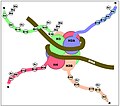Endurance
Endurance is the ability of an organism to exert itself and remain active for a long period of time, as well as its ability to resist, withstand, recover from, and have immunity to trauma, wounds, or fatigue. It is usually used in aerobic or anaerobic exercise.
Overview[edit]
The term endurance is broad in scope and can refer to several different aspects of physical fitness. In general, it refers to the ability to continue performing a task for an extended period of time. This can include anything from running a marathon to simply being able to stand or sit for long periods without fatigue.
Types of Endurance[edit]
There are two types of endurance, both of which are important for overall fitness:
- Aerobic endurance - This refers to the ability of the cardiovascular system to deliver oxygen to the muscles and remove waste products during prolonged physical activity. This type of endurance is often associated with activities such as running, cycling, and swimming.
- Anaerobic endurance - This refers to the ability of the muscles to work in the absence of oxygen. This type of endurance is often associated with activities such as weight lifting and sprinting.
Training for Endurance[edit]
Training for endurance involves a variety of techniques, including:
- Long, slow distance training - This involves performing an activity at a low intensity for a long period of time. This type of training is often used by marathon runners.
- Interval training - This involves alternating between periods of high-intensity and low-intensity activity. This type of training can help improve both aerobic and anaerobic endurance.
- Fartlek training - This is a combination of long, slow distance training and interval training. It involves varying the intensity of the activity throughout the workout.
Benefits of Endurance Training[edit]
Endurance training has a number of benefits, including:
- Improved cardiovascular health
- Increased lung capacity
- Improved muscular strength and endurance
- Increased bone density
- Improved mental health
See Also[edit]
References[edit]
<references />
Ad. Transform your life with W8MD's Budget GLP-1 injections from $49.99


W8MD offers a medical weight loss program to lose weight in Philadelphia. Our physician-supervised medical weight loss provides:
- Weight loss injections in NYC (generic and brand names):
- Zepbound / Mounjaro, Wegovy / Ozempic, Saxenda
- Most insurances accepted or discounted self-pay rates. We will obtain insurance prior authorizations if needed.
- Generic GLP1 weight loss injections from $49.99 for the starting dose of Semaglutide and $65.00 for Tirzepatide.
- Also offer prescription weight loss medications including Phentermine, Qsymia, Diethylpropion, Contrave etc.
NYC weight loss doctor appointmentsNYC weight loss doctor appointments
Start your NYC weight loss journey today at our NYC medical weight loss and Philadelphia medical weight loss clinics.
- Call 718-946-5500 to lose weight in NYC or for medical weight loss in Philadelphia 215-676-2334.
- Tags:NYC medical weight loss, Philadelphia lose weight Zepbound NYC, Budget GLP1 weight loss injections, Wegovy Philadelphia, Wegovy NYC, Philadelphia medical weight loss, Brookly weight loss and Wegovy NYC
|
WikiMD's Wellness Encyclopedia |
| Let Food Be Thy Medicine Medicine Thy Food - Hippocrates |
Medical Disclaimer: WikiMD is not a substitute for professional medical advice. The information on WikiMD is provided as an information resource only, may be incorrect, outdated or misleading, and is not to be used or relied on for any diagnostic or treatment purposes. Please consult your health care provider before making any healthcare decisions or for guidance about a specific medical condition. WikiMD expressly disclaims responsibility, and shall have no liability, for any damages, loss, injury, or liability whatsoever suffered as a result of your reliance on the information contained in this site. By visiting this site you agree to the foregoing terms and conditions, which may from time to time be changed or supplemented by WikiMD. If you do not agree to the foregoing terms and conditions, you should not enter or use this site. See full disclaimer.
Credits:Most images are courtesy of Wikimedia commons, and templates, categories Wikipedia, licensed under CC BY SA or similar.
Translate this page: - East Asian
中文,
日本,
한국어,
South Asian
हिन्दी,
தமிழ்,
తెలుగు,
Urdu,
ಕನ್ನಡ,
Southeast Asian
Indonesian,
Vietnamese,
Thai,
မြန်မာဘာသာ,
বাংলা
European
español,
Deutsch,
français,
Greek,
português do Brasil,
polski,
română,
русский,
Nederlands,
norsk,
svenska,
suomi,
Italian
Middle Eastern & African
عربى,
Turkish,
Persian,
Hebrew,
Afrikaans,
isiZulu,
Kiswahili,
Other
Bulgarian,
Hungarian,
Czech,
Swedish,
മലയാളം,
मराठी,
ਪੰਜਾਬੀ,
ગુજરાતી,
Portuguese,
Ukrainian






